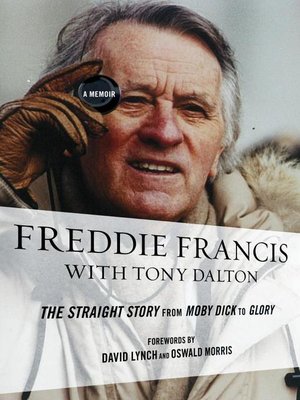
Sign up to save your library
With an OverDrive account, you can save your favorite libraries for at-a-glance information about availability. Find out more about OverDrive accounts.
Find this title in Libby, the library reading app by OverDrive.



Search for a digital library with this title
Title found at these libraries:
| Loading... |
In a film career that spanned more than seven decades, Freddie Francis distinguished himself as both an award-winning cinematographer and as a director of classic British horror films of the 1960s and 70s. From his formative years as a clapperboy and camera assistant in the 1930s to his work as camera operator, director of photography, and director through the 1990s, Francis had a unique behind-the-scenes perspective on filmmaking, particular British cinema. Throughout his career, Francis was honored with several BAFTA nominations and received Academy Awards for Sons and Lovers and Glory.
Freddie Francis: The Straight Story from Moby Dick to Glory, a Memoir is a personal story by one of the great British filmmakers of the 20th century. In this engaging volume, Francis provides a firsthand account of working on such classics as The Small Back Room, Beat the Devil, Room at the Top, Saturday Night and Sunday Morning, The Elephant Man, The French Lieutenant's Woman, Cape Fear, and The Straight Story. He also reveals what is was like to work with some of the most significant filmmakers on both sides of the Atlantic, including Carol Reed, René Clair, Michael Powell, Emeric Pressberger, John Huston, Karel Reisz, Robert Mulligan, Jack Clayton, Martin Scorsese, and David Lynch. With his own brand of humor and charm, Francis recounts his career as a director for the British horror studios Hammer Films and its chief rival, Amicus Productions.
Freddie Francis's memoir provides an insider's view of the British Film industry from the mid-1930s to the 1990s. As such, it will appeal to both scholars of cinema and anyone interested in the golden age of filmmaking in the latter half of the twentieth century.
Freddie Francis: The Straight Story from Moby Dick to Glory, a Memoir is a personal story by one of the great British filmmakers of the 20th century. In this engaging volume, Francis provides a firsthand account of working on such classics as The Small Back Room, Beat the Devil, Room at the Top, Saturday Night and Sunday Morning, The Elephant Man, The French Lieutenant's Woman, Cape Fear, and The Straight Story. He also reveals what is was like to work with some of the most significant filmmakers on both sides of the Atlantic, including Carol Reed, René Clair, Michael Powell, Emeric Pressberger, John Huston, Karel Reisz, Robert Mulligan, Jack Clayton, Martin Scorsese, and David Lynch. With his own brand of humor and charm, Francis recounts his career as a director for the British horror studios Hammer Films and its chief rival, Amicus Productions.
Freddie Francis's memoir provides an insider's view of the British Film industry from the mid-1930s to the 1990s. As such, it will appeal to both scholars of cinema and anyone interested in the golden age of filmmaking in the latter half of the twentieth century.






